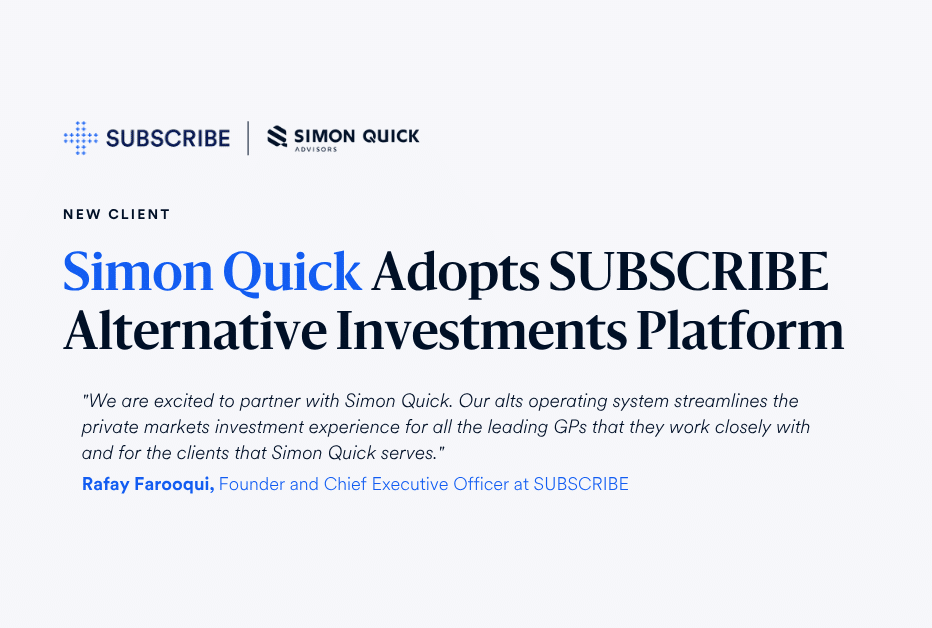Three Key Trends in Alternative Investments for 2023
Alternative investment platform SUBSCRIBE talks high-net-worth investors
and the mid-term outlook for private debt and real estate
High-net-worth investors (HNWIs) are moving increasingly beyond the traditional portfolio and warming to more alternative asset allocations. The group is moving away from the traditional 60/40 portfolio to a 50/30/20 model, which includes alternative investments. But even as this group has been moving more to alternative assets, aggregate allocation numbers show that they are still not fully invested. Single family offices have the highest average private equity policy target allocation of about 28.8% of total assets yet remain just under with their average actual allocation of 27%.
Likewise, multi-family offices remained under-allocated by 3.5 percentage points (14.6% target), while wealth managers were slightly under their 17.9% average target. We see this continuing for the next decade, making it a robust long-term opportunity for the entire investment management industry. However, this is not the only trend we have observed, and the following are others that we think will continue throughout 2023 and into 2024.
“As infrastructure improves and operational solutions develop, enterprise technologies will provide opportunities to consolidate fund-investment operations and yield full- service platforms that serve LPs, GPs, and service providers throughout the investment lifecycle.”
Private debt
LP allocation to private debt managers has accelerated over the past five years with year-over-year increases in fund raising and we feel this will continue. On average, private debt fundraising grew 10% annually over the five years ending 2022 when funds secured more than $208bn in capital commitments. Furthermore, a look at Preqin’s most recent investor survey, shows that 63% of institutional investors polled said they intend on increasing their long- term private debt allocations. That’s more than private equity (47%) and just ahead of infrastructure (58%). Within private debt, demand remains healthy for sponsor-backed, middle-market investment opportunities. We’ve seen increased interest in niche opportunities. The healthcare and biotech deal markets have been very active, offering higher-quality assets and attractive pricing. We expect these exposures to attract a higher portion of allocations than in the past.
Real estate
Real estate investors, specifically for those investing in real estate assets, may find 2023 challenging. Inflation, rising interest rates, and the threat of recession are weighing heavily on commercial real estate assets. Furthermore, we see this trend spilling over into the real estate secondaries market and some assets will need to be sold at discounts.
Evolving enterprise technologies
Despite economic headwinds, increased volatility and uncertainty will present opportunities to investors. But a focus on due diligence and careful selection will be critical in finding value in private-market assets. Key to this is digital transformation, which will add value for all industry participants. Improved data availability will speed- up decision-making and reduced operational friction will improve efficiency. Better transparency, access, due diligence, transaction management, and reporting will facilitate a higher degree of benchmarking for investable opportunities. This is something we’re already seeing as more digital platforms come online and access improves. As infrastructure improves and operational solutions develop, enterprise technologies will provide opportunities to consolidate fund-investment operations and yield full- service platforms that serve LPs, GPs, and service providers throughout the investment lifecycle.
Rafay Farooqui is the Founder and CEO of SUBSCRIBE, a leading enterprise software company that is Powering Alternative Investments®® for institutional allocators, sponsors, and service providers. Prior to SUBSCRIBE, in 2009 Rafay co-founded CAIS, a fintech company offering a menu of curated alternative investment funds to wealth management firms.
SUBSCRIBE, the leading order management system for alternative product transactions, allows any LP, GP, or SP to compliantly mobilize and digitize their investor onboarding processes and fund subscription documents in minutes. This technology ushers in the digital transformation of the private markets, and leads the pack of E-SubDoc platforms available in the market today by transacting billions of dollars’ worth of subscriptions. It serves over 4,000 institutional LPs, 700 GPs, and 4,000 of their fund offerings, and is integrated with over 400 service providers, from law firms and fund administrators to capital introduction and placement agents, among others.
ABOUT SUBSCRIBE
SUBSCRIBE is a fintech company digitally transforming the landscape of alternative investments for fund managers, institutional investors, wealth managers, law firms, and fund administrators. Our platform technology modernizes the archaic infrastructure of private fund investments by delivering a central operating system — catering to every role within the investment process empowering them to connect any fund, any investor, anywhere in the world on a single platform.



